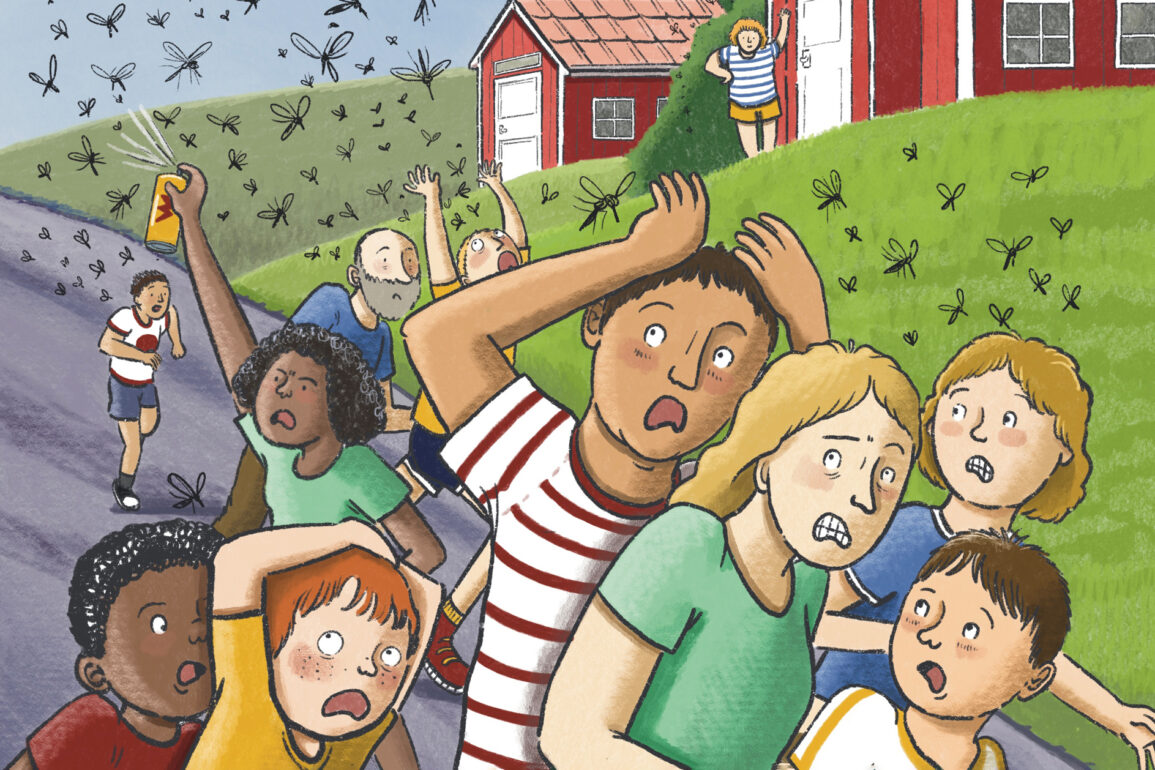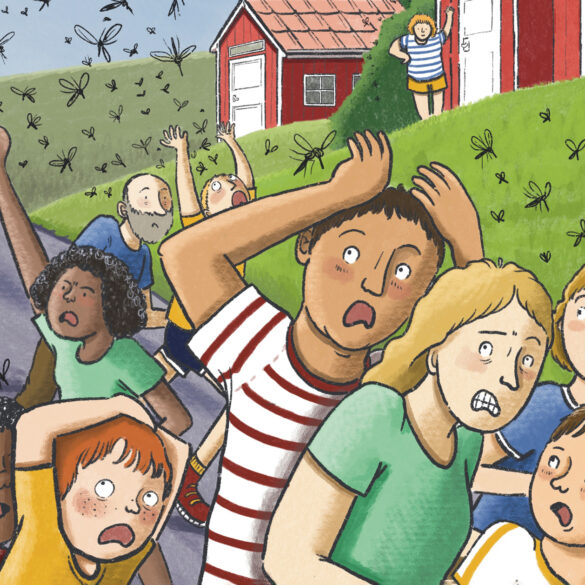Paul Connolly recalls his first summer in Norrland, when he and his girlfriend Donna became rather too familiar with the bloodthirsty mygga, or mosquito. At the end of the feature we offer advice on how to deal with the pest. Illustration by Jessica Kwan.
The sound of arrhythmic clapping started around mid-June. Suddenly our little rental house in Vuollerim, just south of Jokkmokk, sounded like the audition venue for the world’s angriest, but least funky, drummers, as short bursts of frantic clapping were punctuated by shouts of ‘bastards!’ and ‘take that you little bugger!”.
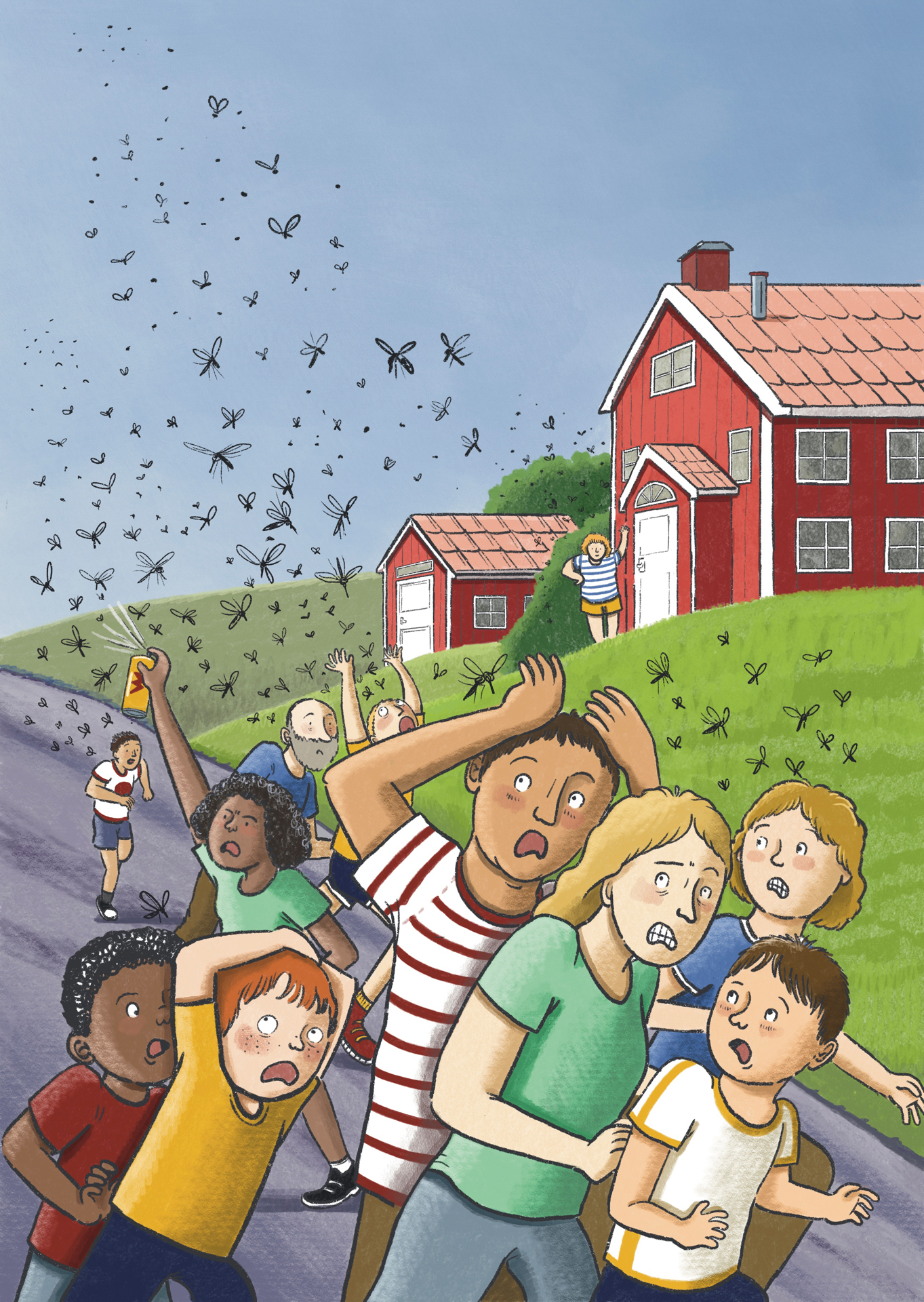
Loathe and detest
The mosquito season had arrived in northern Sweden. And what a season it was. Of all the clichés I’d read and heard about the north, the one about mosquitos was one I really wanted not to be true. I loathe and detest all flying things. Hell, I’d ban birds if I could. But flying things that bite you? What’s that all about?
According to my friend up here, David, “the whole mosquito thing is overblown – they’re really not that much of a problem unless you’re going fishing by a lake at midnight.”
As my girlfriend Donna hurtled around the house sounding like a cross between Bruce Lee (“Aiiiiiiii-yaa!”) and Father Jack from Irish-British sitcom Father Ted (“Feck!”), I repeated these words to David on the phone. I may have shouted them at him accusingly, I can’t remember. I was wrestling with a four meter mygga at the time.
Getting ugly
He was maddeningly calm.
“Yes, I’ve heard they’re really bad in Vuollerim this year. The worst for 20 years. Someone in Vuollerim posted on Facebook that they’re getting into houses even if the windows are shut.”
I confirmed that this was indeed true and hung up – there were now mozzies everywhere in our wee house. Things were getting ugly.
Viking mosquitos
The mosquito plague even affected our house-hunting that summer. The second day after they first reared their whining ugly little heads, we went to see a house on a lake. With quite heavy tree coverage. Both Donna and I were blitzed.
The critters attacked us so aggressively their bites actually stung. They were like Viking berserker mosquitos. It didn’t help that I’d made a questionable clothing choice by wearing shorts.
The homeowner, however, was quite regally unbothered. While we were running around his property swatting and yelping, he looked on in detached bemusement. This was to become a theme. A few days later we went to see another house by a lake. The owner, a former army chaplain, had all the doors and windows in the house open. The whole place was alive with insects. A broms or horse fly in English (an insect so unutterably aggressive and evil its mere existence must surely make even the most religious of people question their faith in a god) pursued me remorselessly as I waved and flapped like a swan in a cattery. In a brief moment of respite (I think the horse fly had tracked and taken down a bear instead), I asked the owner about the mosquito situation.
“I think we are lucky here. We do not seem to get that many of them.”
As he spoke, both Donna and I were transfixed. There, on his left cheek, two mosquitos were attempting to copulate. He wasn’t just not worried about his face being a hook-up joint for randy bloodsuckers; he didn’t even seem to notice. As nice as the house was, we left swiftly. It was mygg hell. At another house, while Donna and I hopped and swatted, an estate agent told us that he only gets one or two bites a year.
“Most of my friends are the same. We don’t seem to get bitten that much.”
Is that it? Are Swedes habituated to mosquitos? How long does that habituation take? Are there pills you can take? A surgical procedure? I don’t care; give me a lagom injection if that’s what it takes.
We finally did find a house. It’s by a lake too. And there’s very little tree coverage, so the mygg get blown about and dispersed but we took no risks. We purchased a Mosquito Magnet machine, and five mosquito net windows. But it’s not been anywhere as near as bad since that first summer. Sadly, with the huge amount of snow this winter, which means plenty of standing water in spring for the little savages to breed in, this could be another bumper year for mygg. Better get ready to rumble!
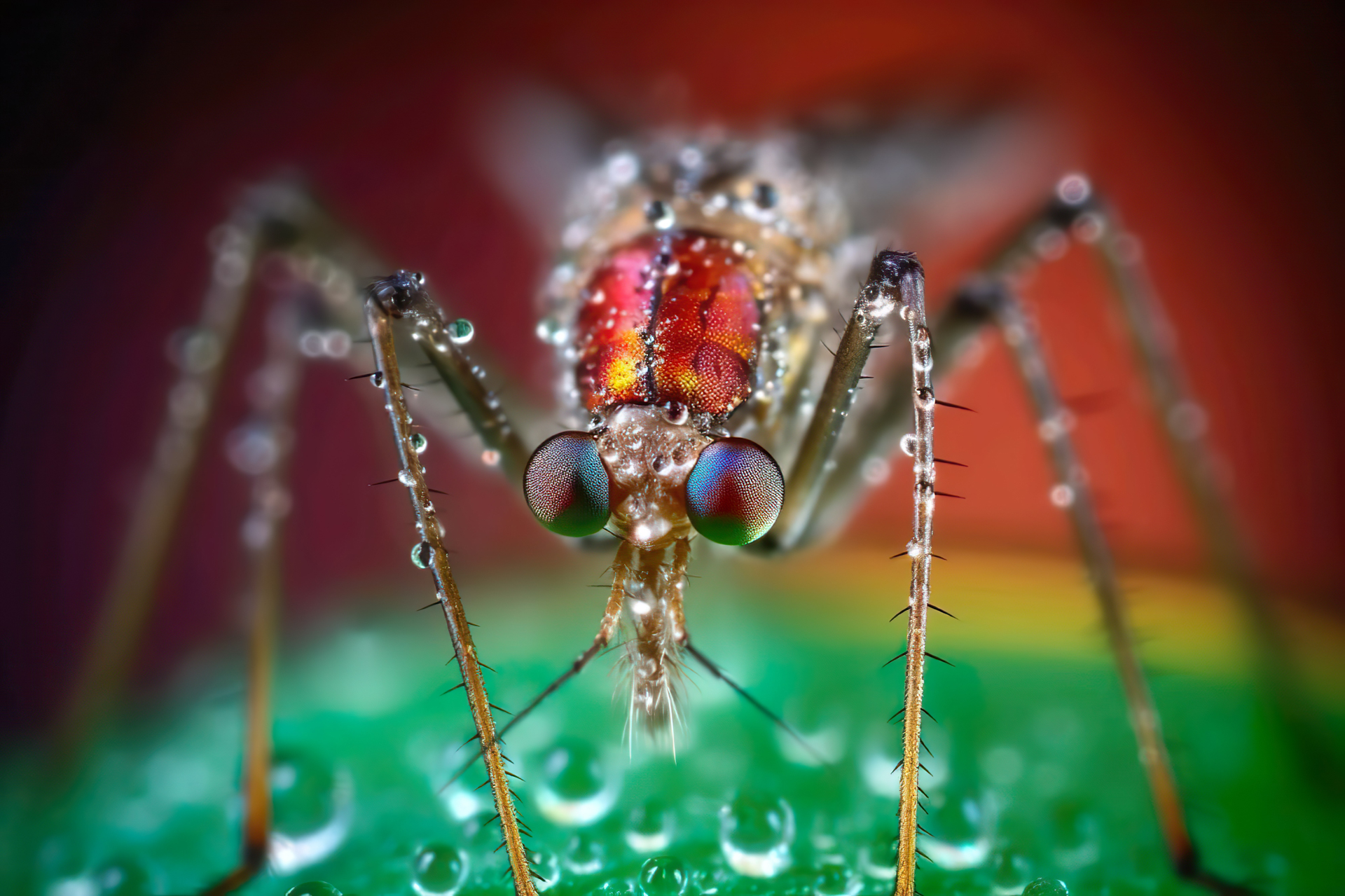
Battle the bloodsuckers:
To keep the pesky mosquitoes away, ditch the stagnant water around your home.
By removing any water sources like old tires, buckets, and flower pots, you can reduce the number of mosquitoes buzzing around.
Don’t forget to check your gutters and downspouts too, they can be a breeding ground for mosquitoes.
If you’re not a fan of just standing around and waiting for the pesky dirtbags to bite you, try mosquito repellents. A variety of options are available, from sprays to lotions to candles. Look for deet, picaridin, or oil of lemon eucalyptus in your preferred product as they are known for repelling mosquitoes. But do follow the label instructions and reapply as needed.
For those who prefer a more organic approach, try planting mosquito-repelling plants such as citronella, lavender, and marigolds. They contain natural compounds that mosquitoes despise and can help to keep them away.
Traps are another alternative to reduce the number of mosquitoes in your area. Carbon dioxide, light, or heat, various methods are employed by these devices to attract and trap mosquitoes. But keep in mind that they can be pricey and, in our experience although often effective, they do break down rather regularly.
Also, try wearing long-sleeved shirts and pants when you’re outside, especially during dawn and dusk when mosquitoes are most active. It’s only a fool who wears shorts at dusk.
Screens on your windows and doors to keep mosquitoes out of your home are absolutely essential. And don’t wear perfumes or scented stuff. You’ll only attract bugs!
